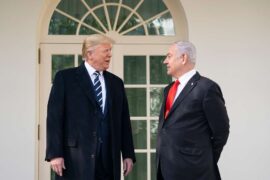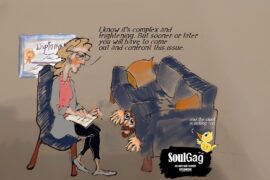There is a fundamental misunderstanding within Israeli politics that pits the concept of a “Jewish state” against that of “a state of all its citizens.”
This great misunderstanding stems from a radical redefinition of these terms. A Jewish state comes to mean an exclusivist state that privileges Jews over non-Jews and a state of all its citizens comes to mean a European-style liberal state devoid of any unique identity.
When these terms are critically examined and defined with greater accuracy, however, it becomes apparent that these ostensibly competing ideals are not necessarily opposite poles but rather mutually inclusive ends that require one another in order to achieve their own fulfillment.
Rav Yehuda HaKohen teaches that if we can transcend European understandings of national identity, we can shift our focus away from the Jewishness of our state’s skin and towards the Jewishness of our state’s skeleton and organs.
According to HaKohen, this would allow for the State of Israel to be simultaneously experienced by Jews educated in their own culture and identity as deeply Jewish while at the same time experienced by non-Jews and even many less Jewishly educated Jews as a fully democratic society where everyone enjoys full material equality. The state’s Jewish character would essentially become softer and deeper to the point that anyone looking for it would find it and those uninterested in it wouldn’t notice it.
The question HaKohen is challenging us to explore is whether or not there exists a uniquely Jewish approach to the rights and status of non-Jews in a Jewish society that can be more inclusive and healthy for society than the current Western models that exist while making our state more inherently Jewish in the process.
From the perspective of our ancient laws, there is a clearly mandated place for the Other in a Jewish society.
As derived and cited from D’varim 20:10, Jerusalem Talmud Shevi’it 6:1, Mishne Torah Hilkhot Melakhim 6:1, among many other sources, there is a Jewish responsibility to offer all residents of our country peace under the conditions of taxpaying, willingness to perform national service, and adherence to the Seven Laws of Noaḥ – the basic code of human morality.
It was on this basis that Yehoshua made peace with the Gibeonites. During the Second Temple period, similar agreements were made with national minorities within the Hasmonean Kingdom, many of whom would later fight alongside Jewish freedom fighters during our revolts against Rome, according to the Roman historian Cassius-Dio.
Jewish values, history, and common law mandate, rather than obstruct, the inclusion of national minorities into our society. But since the State of Israel has never attempted to offer this type of arrangement to the Palestinians, one can argue that the Zionists failed in our people’s halakhic obligation to offer peace to the non-Jewish inhabitants of the land.
Even with this in mind, there are many that could yet argue that the Western nation-state structure is superior to a Jewish state in protecting national minorities. According to the liberal Western model of civic national identity, all peoples are encouraged to melt into a single shallow national identity that’s less connected to the histories, identities or values of different groups and more connected to the consumerism permeating the capitalist system, in order to create a lowest-common-denominator identity shared by all.
The Hebrew model, by contrast, recognizes and preserves the identities of various groups in society with the aim of not pasteurizing them into one shallow civic national identity but rather diverse allied collectives who care about what’s important to one another.
The Western nation-state is therefore structured in such a way that national minorities will always be viewed as a threat to the state’s security while a Jewish state is structured in such a way that the presence of national minorities serves to justify its existence.
The Jewish deconstructionist philosopher Jacques Deridda identified the concept of the state as the proth-state, the prosthetic extension of “the self.” In the West, the self is of course the atomized individual.
This is a fundamental concept that penetrates through all of Western thought; the Christian believer who seeks personal salvation through his confessional faith, the Descartesian rationalist who is because he thinks, the Hobbesian subject who forms the leviathan from his atomized state of nature, the Lockean citizen each born with unalienable individual rights, the Rousseauian revolutionary who must liberate himself from all created societal constraints, the Benthamian utilitarian who must calculate each potential action through his individual chance of pain or pleasure, the Heideggerian being-in-the-world who must embrace his mortality as the ultimate sign of his individuality.
Since the state is an extension of the self and the Western self is the individual, the Western nation-state is a state in which the majority of the individuals identify with a common nationality. The secure majority of individuals within the state who identify with this common national identity is the sole matter securing the Western nation-state as such.
The Jewish concept of the self is not the individual, but rather the collective. Knowledge, or consciousness more broadly, exists not only on the individual bodily level, psychological level, but also on the moral and collective levels.
Even on the level of language, the Hebrew “ani” means “I am” rather than “I” (being in the world rather than being for its own sake), a mode of a greater universal Infinite Being rather than an individualized existence. The most fundamental self is not the atomic individual but rather the universal collective. This understanding does not devalue the existence of people, families, or nations but contextualizes their value within the ultimate collective.
The Jewish state, which serves as an extension of the collective Jewish understanding of the self, recognizes the inherent value of the collectives under its domain. Authority is not derived from the sum of individuals but by the responsibility of a collective over a domain and the other many collectives therein. The Jewish state is a state based on collective responsibility rather than individual power, its security deriving from the fulfillment of inherent responsibilities of the responsible collective to the collectives under its domain rather than demographic head-counting. The Jewish people, therefore, don’t have a right to the land of Israel so much as a responsibility to the land and an obligation to everyone therein.
This is quite different from a Western system’s relationship with minorities. The liberal Western relationship is such that a minority group is only as relevant as its relative size, a small group is ignorable, but a large group can be both/either valuable and/or threatening. Latinos in the United States, for example, were largely ignored in national politics until they hit a demographic critical mass in recent decades, where they became seen by one party as a valuable voter base and by the other as an existential threat to the American national character.
In a Jewish system, a collective is inherently valuable no matter how big or small, because its worth is not determined by the sum total of its individual adherents but rather by its place under the national domain and within the universal collective.
Furthermore, while the presence of national diversity threatens the Western nation-state, destabilizing the demographic majority from which said nation-state receives its character, national diversity can strengthen the Jewish state because it enables the fulfillment of our legal and moral Jewish responsibilities to seek peace and grant protection to the non-Jews in our land.
A Jewish state, based on the Jewish conception of the collective self would enshrine Jewish responsibility; strengthening the position of the executive (the Nasi and perhaps eventually the Melekh) as the final guarantor of collective responsibility and enshrining Jewish laws as a check-and-balance against government excess. With Jewish responsibility enshrined in the structures of the state, all voices would be accounted for no matter their size.
These concepts, the Jewish state and the state of all its citizens, which are too often posed as opposites, can indeed be mutually inclusive within the framework of a deeply Jewish society. The Western nation-state framework doesn’t allow for a state to both belong to all its citizens and express the unique identity of a specific collective group if that group isn’t able to maintain a sizable demographic majority. The dominant population of a Western nation-state therefore can only relate to other collectives as a threat. But a Jewish framework is different because the very inclusion of national minorities according to a Jewish legal framework already strengthens and deepens the Jewish identity of the state.
The only way to get a holistically Jewish state is therefore to transform the Palestinians into a respected ally population (similar to our current relationship with the Druze). The only way to embrace and include Palestinians in a way that doesn’t threaten us is through a holistically Jewish state. A Western nation-state is structurally capable of neither.





